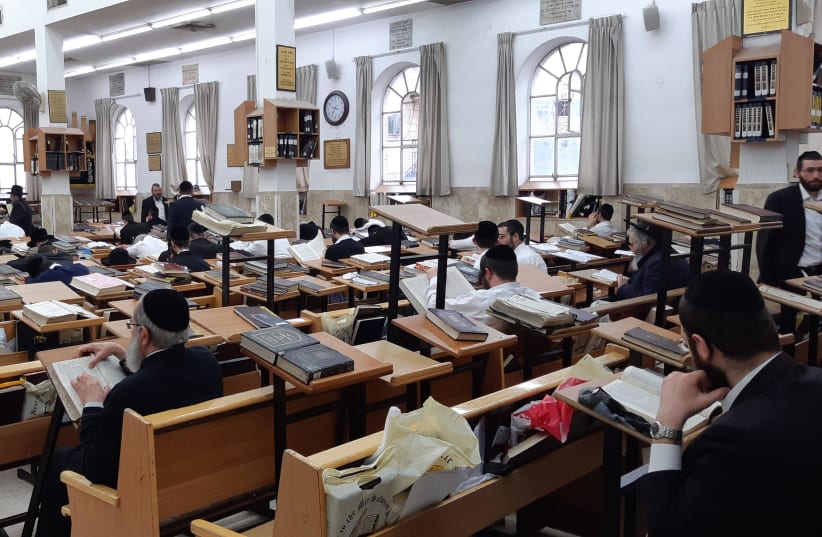Several ultra-Orthodox yeshivas have kept their doors open to students despite Health Ministry instructions for the public to refrain from gatherings of more than ten people.The Mir Yeshiva in the ultra-Orthodox Jerusalem neighborhood of Beit Yisrael conducted studies as usual in the morning according to students at the institution, and although studies continued in the afternoon, the central study hall was not full.In the flagship Ponovitz Yeshiva in Bnei Brak, hundreds of ultra-Orthodox students crammed into the main study hall to continue their studies as usual. Video footage broadcast by Kan News showed students at the yeshiva studying in close proximity to each other, in the traditional “chavruta” or partner format where two students study and discuss a particular text together.
על אף הנחיות משרד הבריאות: מאות בחורים התקבצו ללימוד בהיכל ישיבת פוניבז' בבני ברק | צפו בתיעוד@AkivaWeisz pic.twitter.com/lbP850KJYS— כאן חדשות (@kann_news) March 15, 2020
On Friday, a prominent rabbi in the ultra-Orthodox community, Rabbi Chaim Kanievsky, was asked by his grandson Yaakov Kanievsky if the yeshivas and schools of the community should be closed because of the coronavirus pandemic.Kanievsky replied “God forbid” in his customary, terse style of communication.The radical Eda Haredit communal association of ultra-Orthodox communities decided to close all kindergartens, but has kept open the yeshivas and schools of the various communities.Leading rabbis of the community met with the deputy head of the Eda Haredit, Rabbi Moshe Shternbuch, on Sunday morning to draft its new approach to the coronavirus outbreak, which was approved by the head of the community Rabbi Yitzhak Tuvia Weiss.Yitzhak Weiss, an informal representative of the Eda Haredit, told The Jerusalem Post that since its institutions do not take money from the government, they could not be threatened with a cessation of funding for refusing to close.“It is more dangerous to close the Talmudei Torah [ultra-Orthodox schools], because our tradition says the Torah protects and saves us from calamities, and to close the schools of Torah learning children would do more harm,” said Weiss. “This is how we have acted throughout the ages.”Separately, Sephardi Chief Rabbi of Israel Yitzhak Yosef ruled that men should continue to pray in prayer quorums of up to 15 people in synagogues, in accordance with the instructions of doctors and the relevant government authorities.The chief rabbi said that it was incumbent on the entire public to “obey to the instructions of the health authorities… and God forbid not to belittle them.”According to Health Ministry instructions published on Friday, “prayer services and religious ceremonies should be conducted in groups, each one of up to ten people, while observing a distance of two meters between every person, and not more than two groups at the same time.”A spokesman for the Chief Rabbinate said the instructions mean therefore that up to 20 people can pray in the same place and that Yosef’s ruling is therefore commensurate with the Health Ministry’s instructions.“The sound of school children and communal prayer is a great matter and a rectification for times of plague,” wrote Yosef. “Therefore a person should not refrain from praying with the community, and do everything in accordance with the instructions of doctors,” he ruled, and went on to cite Rabbi Akiva Eger, a Torah scholar of the 18th and 19th century who wrote that “gathering in a confined place is incorrect, but people can pray in groups in small numbers of 15 people.”
